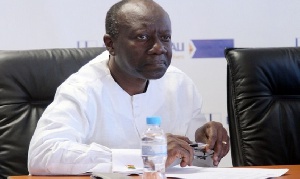Ghanaian are wailing under excruciating pain over government’s continuous freeze on contracts and procurements by state agencies since January, this year.
The agony is compounded by the refusal of the government to settle arrears owed them for contracts executed under the John Mahama administration, but payments were not made.
There have been complaints from both local and foreign entities about one project or the other with the state.
These include, road contractors, suppliers and those working on some of the hospitals, airports and other projects, started by the Mahama government.
Most of these projects, are at standstill and without clear direction as to when work will resume.
Some of the contractors, have had to spent time at the Economic and Organized Crime Office (EOCO), Police CID and Bureau of National Investigations (BNI), answering questions on how they secured the contracts.
An essential road like the Eastern Corridor Road, is also forgotten as there is no activity on that road. The laudable Cocoa roads project in all the areas where cash crop is grown, has been halted by the new management under the claim of mismanagement and forensic audit.
Meanwhile, the first quarter Gross Domestic Product (GDP) figures for 2017, have shown that the services subsector recorded the least growth. The services subsector, recorded a GDP growth of 3.7 percent, down from the 8.8 percent recorded in the same period last year.
The Ghana Statistical Service (GSS), attributes this to the freeze in public expenditure for the first quarter.
For the first quarter of this year, the services subsector, grew by 3.7 percent, representing over fifty percent drop compared to the 8.8 percent growth recorded in the same period last year.
According to the Deputy Government Statistician in charge of Operations, Mr. Anthony Amuzu, the government’s decision to suspend purchasing of vehicles, awarding some contracts, as well as other procurement processes, accounted for the drop.
“Only 18 percent out of the almost 518 million cedis that was programmed for the purchase of goods and services, was utilized. Also for compensation, only 93.4percent of what was programmed was utilized.”
“There was a statement about the suspension of contracts, purchase of vehicles, etc… procurement processes that were supposed to have gone through, were put on hold,” he explained.
Other contributing factors to this decline included; the -82.9 percent growth in real estate between the first quarter of 2016 and 2017; the -64.9 percent growth in finance and insurance sector plus the negative 173.8 percent in growth of public administration, defense and social security.
Citi FM reports that the hotels and restaurants also recorded over 100 percent drop in growth from 7.3 percent to -2 percent between the first quarter of 2016 and the same period this year.
However, the industry subsector comprising manufacturing, mining and quarrying and electricity, all witnessed growth between the one year period. This also culminated in a massive growth (1,145%) in the industry subsector from negative 1.1 percent in 2016 first quarter to 11.5 percent in the same period this year.
The growth in the agric subsector comprising fishing, livestock and crops and cocoa, for the first quarter of 2017 more than doubled. The figure increased from about 2.6 to 7.6 percent. In all, Ghana’s gross domestic product for the first quarter of this year went up to 6.6 percent; from the 4.4 percent last year.
The country’s GDP, recorded 8.5 billion cedis compared from the 8 billion cedis recorded in the same period of last year.
Explaining the reason for the increase in GDP, Mr. Anthony Amuzu said the coming on board of the TEN oilfields increased revenue for the period under review “The year on year change in oil was almost 60 percent compared to the first quarter of last year (2016).
This was also basically because of the coming onstream of the TEN oil fields and that led to the huge growth that was recorded in the oil and gas subsector.”
Business News of Friday, 14 July 2017
Source: theheraldghana.com













